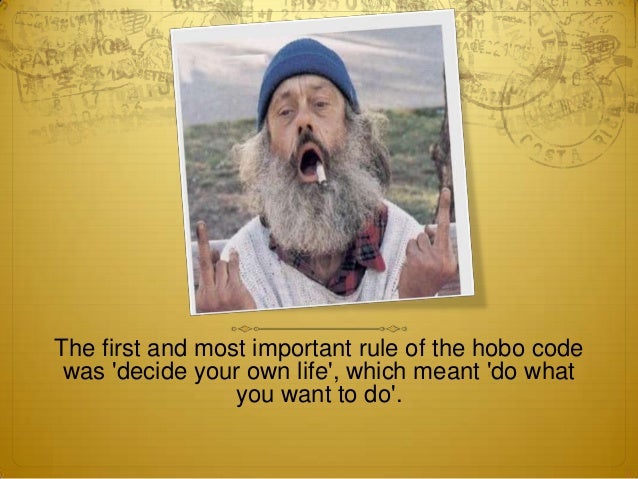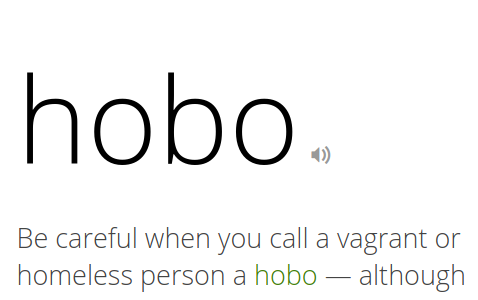


The terms “homeless” and “homelessness” came into lexicon in the 1970’s and 1980’s, when modern homelessness began to appear. She says a hobosexual is someone who dates you with the sole interest of having a place to stay. The widespread use of the word ‘bum’ after World War II signals the end of this colorful subculture of transient labor.” The term hobosexual was first coined by Nakita Nicci, in an article she wrote for Rolling Out. … Hoboes were by and large more organized, militant, independent, and political than. More accurately the tramp, the hobo, and the bum represent three historical stages of American homelessness. In a 2003 interview, Todd DePastino, author of “Citizen Hobo: How a Century of Homelessness Shaped America”, said, “One famous quip had it that the hobo works and wanders, the tramp drinks and wanders, and the bum just drinks.
#Hobo meaning free#
While we may today think of a hobo as a laid-back free spirit riding the rails with a bindle for a pillow, the mass migration of these laborers was born of destitution and desperation, akin to the life of the Joads portrayed in John Steinbeck’s “The Grapes of Wrath”. A tramp never works if it can be avoided he simply travels.”Īfter their post-Civil War emergence, hoboes and tramps became prominent again during the Great Depression. A hobo or bo is simply a migratory laborer he may take some longish holidays, but sooner or later he returns to work. The terms homeless and homelessness came into lexicon in the 1970’s and 1980’s, when modern homelessness. The widespread use of the word ‘bum’ after World War II signals the end of this colorful subculture of transient labor. Mencken wrote, “Tramps and hobos are commonly lumped together, but see themselves as sharply differentiated. Hoboes were by and large more organized, militant, independent, and political than tramps. While the term came into use around the same time as “hobo”, they means different things. “Tramps” also came out of the Civil War era, with the term, originally from England referring to “tramping about”, becoming Americanized as a term for a long war march. Some say it was an abbreviation of “homeward bound” or “homeless boy” author Bill Bryson wrote in his 1998 book “Made in America” that it may have come from “Ho, beau!”, a railroad greeting. The term emerged in the American West around 1890, though its origins are hazy.

after the Civil War, when many men were out of work and their families displaced. Copied from the Hobo Times’ Hobo Travel Guide by Bobb Hopkins


 0 kommentar(er)
0 kommentar(er)
